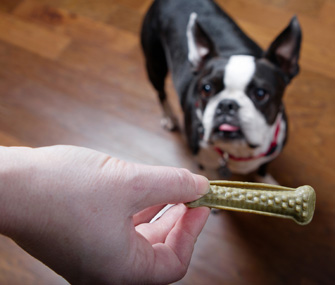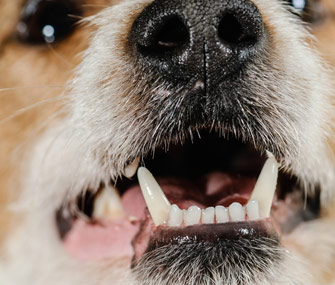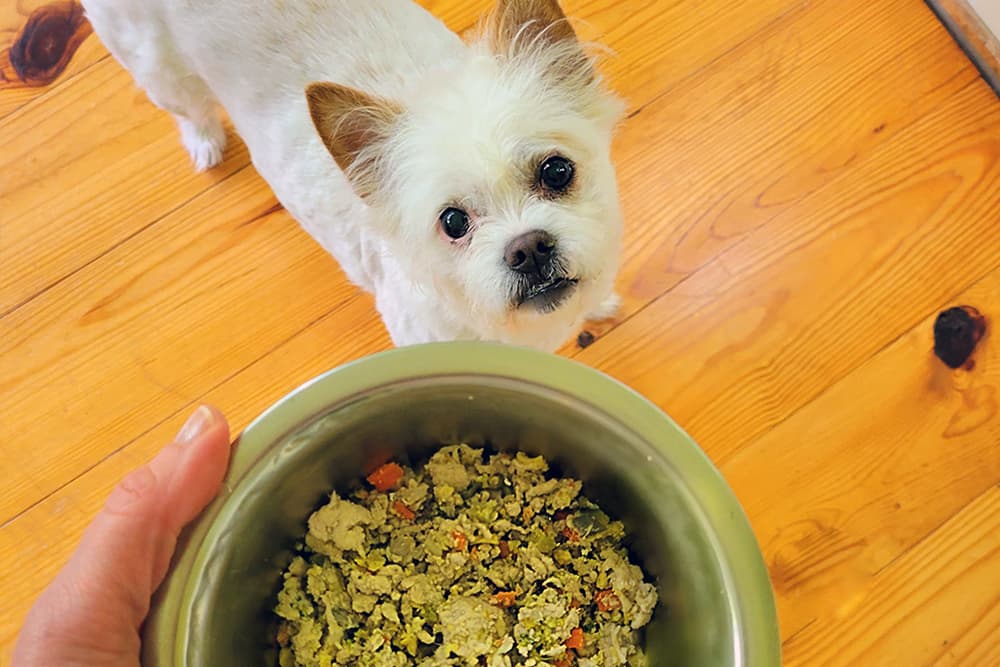Why Your Dog Has Bad Breath and How to Help Fix It
Published on February 28, 2017

Even the most affectionate dog owners would probably admit that their dogs’ bad breath makes receiving those slobbery kisses less than desirable. But bad breath is more than just an inconvenience — it can signal an underlying medical problem. Many conditions and diseases, from common ones like periodontal disease to more complicated problems like end-stage kidney disease, can affect your dog’s breath. Learn what could be causing your dog’s stinky breath and how practicing good at-home dental care, getting professional dental cleanings and using products like Milk-Bone® Brushing Chews® can help maintain his oral health.
Health Issues and Conditions That Could Be Causing Bad Breath
Periodontal disease: By age 3, most dogs suffer from some form of periodontal disease. Bacteria in the mouth can form into plaque and tartar, which can lead to gingivitis and periodontal disease. This condition can be very painful for your dog and may even result in difficulty chewing, tooth and bone loss, and damage to important organs like his heart and kidneys.
Teething: Starting a good dental hygiene routine while your dog is still a puppy can help ward off periodontal disease. But it’s also a great idea for another reason: Teething can cause bad breath in puppies. As your pup’s baby teeth are replaced by growing adult teeth, bacteria may collect at the gumline and cause bad breath. Brushing your puppy’s teeth regularly helps acclimate him to dental care and can help deal with stinky teething breath.
Oral problems: An oral growth, including benign tumors or mouth cancer, is sometimes the culprit behind bad breath. Your veterinarian may also find gingival hyperplasia, which is an overgrowth of the gums that may form deep crevices that breed bacteria.

Gastrointestinal and metabolic diseases: Halitosis (another word for bad breath) goes beyond just the mouth. A gastrointestinal disease that affects your dog’s esophagus, stomach, intestines or other parts of the GI tract can yield foul-smelling breath. Metabolic diseases are a concern, too: Serious conditions like kidney failure and liver disease might lead to the production of high levels of certain metabolites in the blood, which can result in bad breath.
We don’t mean to scare you, but the moral of this story is that bad breath (or, really, any noticeable change in how your dog smells) should be investigated by your veterinarian. While working with your veterinarian to diagnose and treat any underlying causes of halitosis, consider additional ways to help alleviate bad breath. Good overall home dental care, including brushing your canine’s teeth every day with dog-safe toothpaste, is a great start. It may seem like a hassle at first — especially if it takes your dog some practice to get used to — but it’s important to make brushing a priority.
Other Causes of Bad Breath
Your dog’s breath might be stinky because of food residue getting stuck in the back of his teeth or tartar buildup. In addition to daily brushing, it may help to give your dog a Milk-Bone® Brushing Chews® dog treat every day to help with these issues. The innovative shape of this dental twist bone is designed to clean like bristles on a toothbrush, and it can even help clean those hard-to-reach back teeth and down to the gumline. Plus, the chews have the Veterinary Oral Health Council (VOHC) seal of acceptance for tartar control, which means they are clinically proven to help reduce tartar buildup. Milk-Bone® Brushing Chews® also offer 12 essential vitamins and minerals, including calcium to help support strong teeth. And best of all for our noses, Milk-Bone® Brushing Chews® Fresh Breath help combat bad breath.
Remember that no matter how extensive your dog’s at-home dental care is, he still needs to visit the veterinarian for regular dental checkups and cleanings. Your vet will want to examine his mouth — especially if your dog has bad breath — and that usually requires a thorough evaluation under sedation or anesthesia. This allows your vet to probe individual teeth and take X-rays, if necessary. Talk with your vet about how often your dog needs to have professional dental cleanings — for many canines, that’s annually or twice yearly.
Finding out why your dog has bad breath and working to fix it should be a partnership between you and your vet. With a veterinarian’s expertise, careful at-home dental care and tasty products like Milk-Bone® Brushing Chews®, you can help make your dog’s breath kissable once again.





